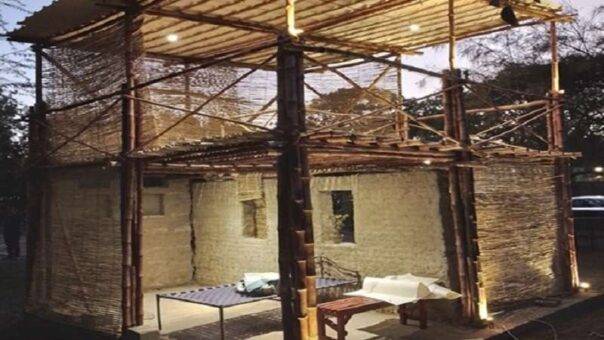Karachi, October 10: In a proactive move to address the escalating challenges of climate-related disasters, Engro Polymer and Chemicals Limited has taken a significant step by offering support for flood-resilient housing solutions in Pakistan.
This initiative is being conducted in collaboration with the Sindh Rural Support Organization (SRSO) and the Indus Valley School (IVS).
At a recent briefing held at the IVS in Karachi, Engro Polymer and Chemicals Limited unveiled its commitment to flood-resilient housing solutions. The company has partnered with the IVS to explore the use of PVC as a primary material for rehabilitation efforts in flood-prone regions.
The IVS students, after conducting extensive research into flood-responsive housing and considering the socio-cultural aspects of rural Sindh, have designed shelters that incorporate regionally-sourced materials and construction techniques. These innovative shelters use materials such as locally sourced bamboo, sun-dried brick, concrete blocks, and recyclable UPVC sheets. Notably, these shelters are designed to adapt to flood conditions, floating when necessary, submerging or blocking water to ensure the safety and security of their inhabitants.
This collaboration between industry and academia showcases how the wisdom of local materials and construction, combined with the expertise of the next generation of architects and designers, can address real-world challenges effectively.
Additionally, Engro Foundation, the social investment arm of Engro Corporation, has joined forces with the Sindh Rural Support Organization (SRSO) to support the construction of 146 climate-resilient residential units in two heavily affected villages in District Kambar Shahdadkot. These elevated units, constructed using readily available materials and recyclable UPVC sheets, are designed to withstand extreme weather conditions. Thatched roofs help regulate temperatures, making the rooms habitable during hot weather. Each unit comprises a room, kitchen, bathroom, and a courtyard. Importantly, the initiative places a strong emphasis on community mobilization, empowering local communities to participate in and take ownership of construction activities.
During the media briefing, Favad Soomro, Head of Engro Foundation, emphasized Engro’s commitment to serving underprivileged communities in Pakistan through strategic community investments in areas such as environment, quality education, health, and livelihoods.
Muhammad Idrees, Chief Commercial Officer of Engro Polymer & Chemicals, highlighted the sustainability efforts of the company, including carbon offsetting, advanced plastic recycling, and water conservation. He emphasized the advantages of PVC as a material for flood-resilient housing, noting its water and termite resistance, fire retardancy, light weight, durability, and low maintenance requirements.
These projects underscore the potential of knowledge, innovation, and community engagement in creating sustainable solutions to the pressing challenges posed by climate-related disasters. In a country like Pakistan, one of the five most climate change-vulnerable nations globally, initiatives like these offer hope to vulnerable communities seeking safety, dignity, and the opportunity to rebuild their lives.
Engro Polymer & Chemicals is actively contributing to the global effort to combat plastic waste as an affiliate member of the World Economic Forum’s Global Plastic Action Partnership (GPAP). Moreover, at the group level, Engro is a member of the UN Global Compact, aligning its operations with the UN’s ten principles to make a meaningful impact.
In a country like Pakistan, where global warming and climate change have resulted in increasingly unpredictable weather patterns, initiatives like these are vital for the resilience and sustainability of communities, especially those living in flood-prone areas like the Indus floodplains.
